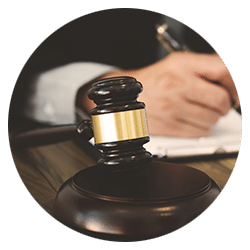Witnesses are the most important storytellers in any litigation setting. Judges commonly caution jurors that “what the attorneys say is not evidence,” and jurors themselves prefer to hear the story directly from witnesses anyway. That means that a witness must be truthful, accurate, and credible.
Perhaps, as an attorney, you anticipate calling a key witness, and you want him or her to be optimally prepared. Maybe you yourself are the witness who’ll have to testify. Either way, Shakespeare’s Hamlet said it best: “The readiness is all.” Jonathan Leach, LLC, offers professionally designed, trial-proven witness preparation strategies to help ensure that witnesses are ready to perform at their best.
What Does Witness Preparation Involve?
Going into a hearing, deposition, or trial, witnesses need to feel prepared and confident. Effective witness preparation draws on time-tested techniques from the fields of psychology, education, and communications to help witnesses calm their fears, strengthen the nonverbal aspects of their testimony, and present themselves as confident, competent, and credible. Certainly the content of their testimony matters. The testimony is taken under oath and becomes a permanent record. So witnesses must have a firm grasp of what they’re going to say. But as jurors and judges evaluate the credibility of a witness, they rely on a variety of cues, most of which are nonverbal. They assess the witness’s facial expressions, gestures, vocal tone, eye contact, and posture. As a witness, have you considered what your body language is saying? Just as important is the “X factor” of fear. Over 20+ years of training witnesses, we find that almost without exception, witnesses feel anxious about their testimony. Even expert witnesses experience anxiety. They anticipate — often with good reason — that being questioned by the opposing attorney will be a nerve-racking, emotionally intense experience. At Jonathan Leach, LLC, we equip each witness with practical tools for better managing the anxiety they have about testifying. We address the hows and wherefores of communicating to a judge or jury. We pay particular attention to the tricks, traps, and curveballs that we have seen used over the years by hundreds of opposing counsel, and we help the witness practice dealing with those attorney gimmicks. Finally, under the guidance of counsel, we subject the witness to a realistic attorney examination. After finishing our series of short but substantive prep sessions, any witness can and should feel more confident and comfortable about testifying.
Depositions vs. Trials
Deposition testimony and trial testimony, though similar, differ in important ways. Each deserves its own type of preparation.
- Depositions – First-time witnesses are often surprised by the peculiar atmosphere of a deposition. To begin with, the informality of many depositions comes as a surprise. Although the testimony is given under oath, the look and feel of a deposition can be deceptively casual. Without careful preparation, witnesses may find themselves offering much more information than they should. Another surprise is the very limited role that, under the rules, their own attorney plays during the deposition. Although most attorneys will be diligent and attentive during a deposition, they are bound by some very restrictive rules of conduct. Most depositions consist almost entirely of cross-examination by opposing counsel. That means that for all intents and purposes it really falls on the witness to “defend” the deposition. Proper deposition preparation helps the witness know what to expect. He or she is equipped to strike the right balance between being the two extremes: neither overly stiff and fearful, on the one hand, nor overly comfortable, on the other. What’s the sweet spot? A well-prepared witness must be ready to maintain a disciplined, relaxed focus throughout a process that may last several hours.
- Trials – The courtroom is noticeably different from the deposition setting, and of course it comes with dangers of its own. The physical atmosphere of many courtrooms can be quite grand. High ceilings, ornate moldings, and polished wood fixtures are all designed to instill respect, and the formal atmosphere of some courtrooms (especially older ones) can be quite intimidating to the witness who is unprepared. Subjected to the scrutiny of judge and jury, and surrounded by the trappings of The Law, many witnesses react in fear. In turn, these anxious behaviors can sabotage credibility. Tics or mannerisms or inconsistencies in demeanor may be interpreted by some jurors as a sign that the witness is lying. Occasionally, in an effort to purge themselves of anxiety, an unprepared witness will attempt to “explain away” the case in one long, self-serving monologue–a sure recipe for disaster, since it may open up new topics for cross-examination. By contrast, the well-prepared witness understands what to expect, engages effectively with both judge and jury, and maintains the self-discipline that is essential to effective testimony.
How Witness Training Helps the Case
Thorough witness preparation ensures that witnesses understand the “rules of the game.” It helps witnesses anticipate the challenges that often occur, and it gives them tools for telling the truth effectively. An important side benefit of enlisting an independent trainer is that it relieves some of the pressure on the attorney and the legal team. Because witness performance can and does affect outcomes, many attorneys agonize about their own witnesses’ readiness for trial, even as they look eagerly ahead to the day when they themselves can subject the other side’s witnesses to a withering cross-examination. Professional help with preparing witnesses–always under the guidance and direction of counsel–frees up resources for preparing motions, drafting opening statements, reviewing expert reports, and the other myriad obligations that are part of preparing for trial. A well-prepared witness is one fewer worry.
What to Expect
Witnesses can expect to be taught:
- Body language techniques
- Ways to manage pitch and tone in speech
- Tips for managing anxiety
- Concerns that must be addressed in order to heighten credibility
- Behaviors to expect from the jury
- Answers to practical “housekeeping” questions (Where do I sit? When do I stand? Where do I look?)
- The particular factors affecting deposition testimony
- The differences between testifying at trial and in deposition
Every witness is unique. Each begins from his or her own starting point. Whatever their particular circumstances may be, we make it our goal to ensure that witnesses feel comfortable, are confident in what they have to say, and are ready to present their testimony, even when confronted by the most skilled cross-examiner.

 How Witness Preparation Can Aid Your Case
How Witness Preparation Can Aid Your Case







